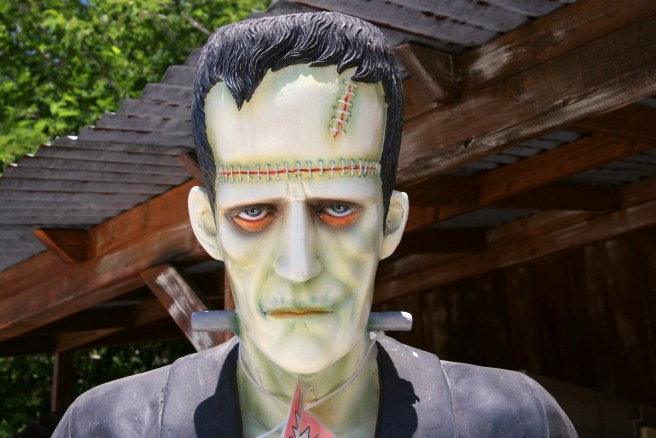
The term ‘recovery’ has come under a harsh microscope recently in academic and clinical settings. It has been interrogated, scrutinised, criticised, bloated and dissected. Reconstructed like Frankenstein’s monster, recovery is now seen to be a floating signifier, made of disparate bits that don’t necessarily fit comfortably together – a stumbling, lumbering construct. Is recovery becoming of little use to anyone and, quite possibly becoming a stigmatising and dangerous term?
Like Mary Shelley’s monster, you might expect recovery to be sitting bruised and battered now in the corner, bolted head in sutured hands, saying, ‘I shall collect my funeral pile and consume to ashes this miserable frame’.
But that’s not what’s going on. Recovery is not dead. It’s not pushing up the daisies. If we think that, we’re looking in the wrong direction. Turning our gaze away, the black and white flicker of horror movie fades and is replaced by widescreen, Technicolor certainty. It turns out that recovery remains real, resilient and very relevant.
Glorious Gatherings
Today and tonight in thousands of mutual aid groups, in person and online, in 12-step mutual aid fellowships, in SMART and LifeRing, Women for Sobriety meetings and other gatherings, people who value recovery as part of their identity will gather to support each other and bolster their chances of success. There is convincing evidence that, in terms of positive outcomes, their shared efforts do at least as well as, or better than, other professional established psychological interventions.
Many thousands more will connect in a host of ways with lived experience recovery organisations (LEROs) outside of mutual aid. Even in a wee country like Scotland we have scores of these, where individual and group recovery identity are not only core to meaning and purpose, but drivers of action. Fuelled by passion and altruism, members want to identify with others and support their peers to make gains across a range of life domains. Oddly, there is a dearth of academic interest in this remarkable phenomenon.
Recovery advocacy
Aside from these self-supporting communities of recovery, something else is happening. Those with lived experience of addiction and recovery who have not had their needs and goals met in our wider treatment and support systems are finding their voices and calling for change. A new recovery advocacy movement is emerging. Reacting to the patriarchal and out of kilter power relationships endured in some treatment settings, activists strive for something better. Recovery in this domain is visible, underpins the urgency of advocates and is a powerful catalyst for reform.
The proof of the pudding
Despite the criticisms of recovery, having a recovery identity has been consistently associated with improved outcomes in the scientific literature. Frings, Wood and Albery say in their paper published last month, ‘Recently, social identities associated with recovery have been linked with better recovery related outcomes such as treatment retention, abstinence and confidence in one’s ability to maintain treatment goals such as abstinence and harm reduction’.
In general, higher levels of recovery related identity, or increased differentiation between addiction and recovery related identities, are associated with positive outcomes.
Frings et al, 2021
Say Frings and colleagues, ‘Alongside AA, these effects have been observed amongst varied populations, including other group-based treatments such as SMART, and in both in-patient, out-patient and peer support settings.’
Helping or meddling?
Partly because of these effects, efforts to reconstruct the concept of recovery need to be carefully monitored. There are risks. Recovery is already a broad church, but in widening the doors further and further, we risk making the term meaningless. In addition, while dialogue is welcome, the motivations for the debate are not always clear or good. Some of us working in addiction treatment or research are threatened by people recovering in ‘non-medical’ ways.
At a conference I attended, a presenting medical colleague said, ‘If my patient goes from using crack cocaine seven days a week to six days a week, that’s recovery’. I’d say that’s progress, but recovery is not primarily about the removal of harms, it’s about the accrual of positives.
I suspect that the debates that are currently happening over what recovery means seem of little relevance to wider recovery communities. Their members are not in a state of angst over the definition; they hold the identity and use it to further their own recovery and that of others. They have used the term for decades and are fluent in what it means in personal, functional and social realms. They know what it means. They are living it.
Recovery curators and crusaders
Recovering people are held up by hope, not distracted by definitions, yet their lived experience and credentials as experts by experience must surely be systematically included in this discussion. Recovering people do not own recovery, but for a very long time they have been recovery’s progenitors, curators, caretakers and crusaders. That hasn’t changed. It absolutely does need to be recognised.
Academic reframing of recovery based on data and sundered from lived and living experience risks creating a creature that everyone ends up unhappy with, and ultimately is unhappy in itself. Recovery is not dead. It’s alive, it’s alive! Not only is it alive, it is thriving and spreading with healing in its wake. Let’s acknowledge, value, and build on that and have people with a recovery identity included at the heart of the debate.
Continue the discussion on Twitter: @DocDavidM
Picture credit: Shutterstock PatriciaPix under license
